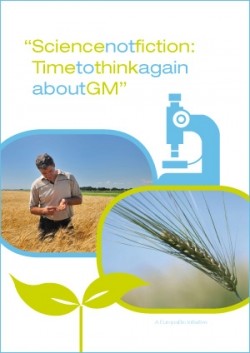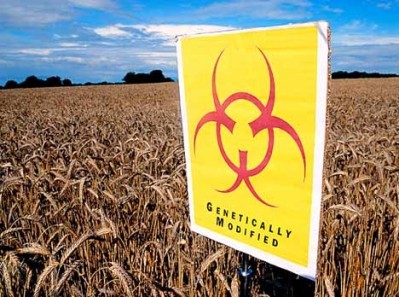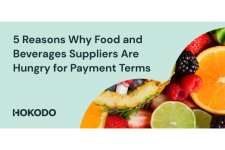‘Scientific consensus on GM greater than climate change’: GM group

Carel du Marchie Sarvass, director of agricultural biology at EuropaBio, made the claim while launching a new report − Science not fiction: Time to think again about GM − designed to allay widespread fears about GM food.
Sarvass said: “It is critical that we work to engage with the public to overcome any misunderstandings related to the technology. We need to help people understand how they and the environment can benefit from including GM in the European farmer’s agricultural toolkit.”
National and European authorities should play a bigger role in communicating the benefits of GM science to the public, he added.
GM food is just one of a number of controversial new technologies to be discussed in a free, one-hour, food science and technology webinar to take place at 11am GMT on Thursday January 24. Book your free place here.
Bill Gates
The EuropaBio report – which invoked support from key opinion-formers such as IT guru and philanthropist Bill Gates and the World Health Organisation – aimed to address specific consumer fears and redress what it describes as “GM myths”. Those include suggestions that GM food is unsafe to eat and that GM crops contaminate nearby organic and conventional crops, said the report’s authors.
They said the first GM crops were launched in Europe in 1995 amid a climate of scientific and economic uncertainty triggered by:
- Consumers' trust in food science and technology being shaken by mismanagement and poor communication around a series of European food crises: salmonella, dioxin-contaminated chicken feed and BSE or mad cow disease.
- Europeans being angry that regulations designed to protect the safety of their food were not operating properly, and losing trust in the authorities.
- EU citizens' concern that the Common Agricultural Policy had led to over supply of some agricultural produce.
- The first mass anti-globalisation protests aimed at multi-national commerce and trade.
But, said the report, after reviewing 130 research projects involving 500 independent research groups over 25 years, the European Commission concluded in 2011: “There is, as of today, no scientific evidence associating GMOs with higher risks for the environment for food and feed safety than conventional plants and organisms.”
If GM crops were grown in Europe today, the increase in production could be equal to the output from land the size of Belgium every year, according to the researchers.
Anti-GM campaign group GM Freeze
But the anti-GM campaign group GM Freeze claimed today (January 21) that biotech industry claims and regulator reassurances that GM technology is predictable and safe have been shaken by the discovery of viral gene sequence in many GM crops.
Two-thirds of GM crops approved in the US contain the hitherto unidentified viral gene, said the group. Although regulators have insufficient information to determine whether it is safe for human consumption, the European Food Safety Authority had opted for a retrospective review rather than a ban, it added.
Pete Riley of GM Freeze said: “This discovery of this previously unidentified gene in GM crops raises serious concern about the safety of GM food and feed. It totally undermines claims that GM technology is safe, precise and predictable.”
Meanwhile, the Food Standards Agency (FSA), consumer watchdog Which? and Leatherhead Food Research (LFR) will be taking part in the free food science and technology webinar on Thursday January 24 organised by FoodManufacture.co.uk and the Institute of Food Science & Technology (IFST).
FSA chief scientist Dr Andrew Wadge will explain how regulatory frameworks can help to introduce clarity in the debate about controversial food technologies such as GM food, irradiation and nanotechnology.
Sue Davies, chief policy adviser Which?, will place the debate in the framework of consumer acceptability.
LFR principal consumer analyst Nicole Patterson will reveal recent research that uncovers consumers’ perceptions about the communication and application of nanotechnology and GM topics.
The webinar is aimed at anyone in the industry who welcomes a debate based on science and technology rather than mere prejudice. It will also be particularly useful to food sector communicators, food science and technology policy makers, and government science policy makers.
Book your free place for this hour-long webinar here.
What GM supporters say
- Bill Gates: “The Food and Agriculture Organisation estimates that developing countries will have to boost their yields by half to meet the challenge of global hunger. We simply won’t be able to meet that goal without using all the scientific tools at our disposal.”
- John Dalli, former EU commissioner for health and consumer policy: “It is important that we tone down the debate on GMOs [genetically modifed organisms] to a rational level.”
- World Heath Organisation: “GMOs offer the potential of increased productivity, improved nutritional values, that can contribute directly to enhancing human health and development.”
- Phil Bloomer, Oxfam director of policy and campaigns: “I understand the Soil Association’s concerns around GMOs. The fact is, however, there are a lot of GMOs which are necessary. Many small farmers do not have 15 years to wait in order to breed into their wheat the soil nutrition efficiency they need. GM can speed up that process.”
Source: EuropaBio



















